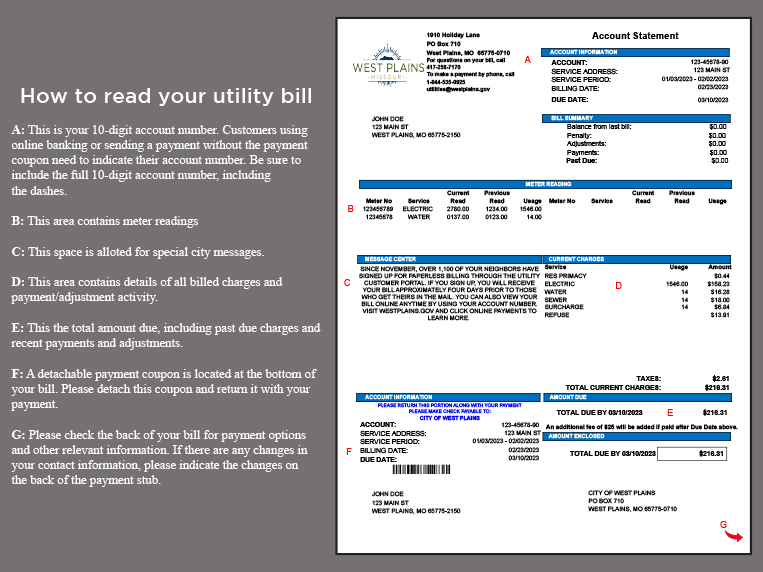How Can We Help
Accounts not paid in full by the 17th will be charged a $25.00 penalty.
Accounts not paid in full PRIOR to the disconnect date listed on the late notice will be charged an additional $50.00 penalty and will be subject to disconnection.
Yard sale permits can be purchased at the City Hall Utility Counter for $1. Citizens are limited to two (2) yards sales per year.

The City of West Plains maintains five utilities: electric, water, sewer, sanitation, and fiber (a dedicated fiber service for a small number of businesses). The city’s utility infrastructure serves approximately 6,300 homes and businesses including some outside city limits. The city’s utility billing team consists of one part-time meter reader, three full-time customer service representatives, a part-time customer service representative, and a utility billing supervisor. Our offices are open from 8 a.m. to 4 p.m. Monday through Friday and we remain open during the lunch hour to assist customers.
Frequently Asked Questions
A: We offer multiple methods for accepting payments 24/7.
• Online: We offer online bill pay, where you can schedule payments and sign up for utility bill autopay. The online portal accepts credit cards, debit cards, Paypal, Venmo, ApplePay and Google Pay. There is a third-party processing fee for online bill payments.
• Phone: Call us 24/7 at 1-417-505-3342 to use our automated system to pay your bill over the phone. There is a third-party processing fee for over-the-phone bill payments.
• Drop Box: You may leave your utility bill payment in the drop box which is located near the flagpole at City Hall located at 1910 Holiday Lane. Please do not submit cash payments through the drop box.
• Mail: You can send your payment coupon and payment to the city at P.O. Box 710, West Plains, MO 65775. Please allow adequate time for mail processing. Postmark dates on the 17th do not constitute timely payment.
• ACH Autopay: We offer automatic withdraws (ACH) from your bank account so your bill payment will never be late. This service has no convenience fee. Stop by the utility billing counter during normal business hours to set this up.
A: The State of Missouri administers a program for low-income households which helps residents fund their utility bills. Locally, these programs are administered through Ozark Action, Inc. (417-256-6147 or online at https://oaiwp.org/energy-assistance/). Additionally, many local churches offer assistance to families who need some extra help paying their necessary utilities.
A: The city’s utilities are fully funded through the rates charged to customers. These revenues cannot be supplemented with taxes. During the budget process, the city’s finance and utilities departments collaborate on a fiscally sound five-year plan for the funding of operations, infrastructure repairs, and improvements. This plan is based on the 30-year Integrated Management Plan presented to Council and approved in 2022. After the expenses are determined, the revenues are projected based on historical usage trends. Rates are submitted to council as part of the budget process in the late summer/early fall and the council holds a public hearing on utility rate changes prior to adopting them in the late fall. Utility rates go into effect on January 1 and will be reflected on the customer’s bill sent in late January.
A: For new customers, there is a $100 deposit to establish utilities at an address as well as a $20 service fee to connect the service and transfer the billing into the new customer’s name. For existing customers who locate to a new address within the city, the deposit on file for that customer will move to their new address and the only additional charge is the $20 service fee for transferring the account. For existing or returning customers who have a past due bill, the deposit is $200 with a $20 service fee and payment in full of any overdue balances. Deposits are held on the account, applied to the final bill, and any unused portion is refunded to the customer after the final bill is processed.
A: The monthly utility billing cycle runs in approximate timeframes with specific dates set based on weekends and holidays. Meters are read in the first ten days of the month. Most electric meters are read remotely in the office and do not require an on-site visit to read the meter. Once meter readings are complete, they are imported into the billing system and the utility team completes the billing process. This generally takes a day for importing the meter reads, a day for calculating the bills, and a few days for the team to analyze high/low bills for reasonableness based on average weather for the month being billed compared to the previous year. Once billing is complete, a file is sent to the city’s third-party printing/mailing service. It typically takes two business days for printing and processing and approximately three business days for mail delivery. Customers who sign up for paperless billing generally receive their bills sooner as they are delivered one business day after bills are finalized (as opposed to five business days later for paper bills).
A: Utility bills for paperless customers are generally received between the 25th-26th and for paper billing customers via mail within the last day or two of the month. If it’s the 2nd or later and you have not received your bill, please contact our customer support team at 417-256-7170. An electronic bill can be emailed or a paper bill can be made available at our offices. Utility bills are also accessible online (even if you are not a paperless billing customer) through the customer payment portal.
A: Generally, utility bills are due on the 17th of the month by close of business (4 pm). If the 17th falls on a holiday or weekend, the due date is the first business day following the 17th. Late fees of $25 are assessed on unpaid balances the morning after the due date. The due date is printed on the monthly bill.
Service disconnection generally falls on the 2nd business day of the month for balances remaining unpaid at 3:00 p.m. on the 1st. If the 1st falls on a holiday or weekend, the deadline moves to the next business day. Once the disconnect deadline passes, a $50 penalty is assessed and the electric and/or water services are subject to disconnection. The bill amount and penalties must be paid in full prior to reconnection of service.
A: Yes! The city encourages customers to sign up for paperless billing options regardless of their chosen method of payment. Paperless billing is free and you can sign up in the customer billing portal by creating a user account. You also can choose to view your bill online without setting up an account, but you will need your account number and the last name of the account holder to access that information.
A: Electronic payment methods are processed by a third-party, regardless of whether they are submitted from your home or from our utility billing office. This third-party sets the processing fees for electronic payment types. While most businesses can roll those costs into their bottom line, the city opts to not increase the rates for all customers by covering the processing fees for those who choose to pay via electronic methods. The processing fee revenue is kept by the third-party and is not available to offset utility or city operations.
A: Periodically, phone scammers call our customers threatening to cut off utility services unless payment is made immediately over the phone or using gift cards. This is a scam. We do not initiate calls demanding payment over the phone and we NEVER accept gift cards as a form of payment. If you are unsure whether a utilities call is legitimate, HANG UP.
If you are truly behind on your utility bill payments, we will send a notice after the 17th of the month stating that your bill is past due and that if you do not pay by the shut-off date (generally the 1st), your utilities services will be turned off. If you are ever unsure of the status of your account, you can call our customer service team at 417-256-7170 or you can check your account online at: https://westplains.gov/city-utilities/
A: A demand charge is a charge placed on certain commercial and industrial accounts that put a greater demand on the electric system than other users. The billing item for demand uses the peak 15-minute usage over the past twelve-month period to establish the demand billing for the month. Often, this results in a relatively stable bill for the demand and is generally only reset once a reading surpasses the previous high. The basic premise behind a demand charge is that the system must be built and maintained to provide for those peak usages regardless of whether the customers are at the peak or at something lower. Therefore, customers who put more strain on the system are charged this demand fee to offset the overall cost of maintaining the system at the peak requirements. Lower use customers (generally all residences) are not charged demand.

